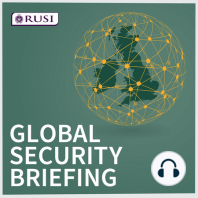48 min listen

The Iran Nuclear Deal and Regional Security in the Middle East
The Iran Nuclear Deal and Regional Security in the Middle East
ratings:
Length:
41 minutes
Released:
Mar 23, 2022
Format:
Podcast episode
Description
This episode examines the ongoing international negotiations over Iran’s nuclear programme, the implications of a potential nuclear agreement for security in the Middle East and Iran’s regional policies, and the likely future Middle East role of the United States and European powers. Dr.Tobias Borck, Research Fellow for Middle East Security Studies, and Darya Dolzikova, Research Fellow in Proliferation and Nuclear Policy programme, discuss with Dr Neil Melvin, Director, International Security Studies at RUSI, the efforts to revive the Joint Comprehensive Plan of Action (JCPOA) to regulate Tehran’s nuclear programme. The relationship between Iran’s nuclear activities and its regional security engagements is examined, together with a consideration of the possible future regional engagement by the United States and European states.
Released:
Mar 23, 2022
Format:
Podcast episode
Titles in the series (100)
The UK, Russia and Strategic Stability: This episode examines the re-emergence of the concept of strategic stability as a means of managing security relations between Russia and the transatlantic community and avoiding war. Following Moscow’s annexation of Crimea in 2014 and its military... by Global Security Briefing